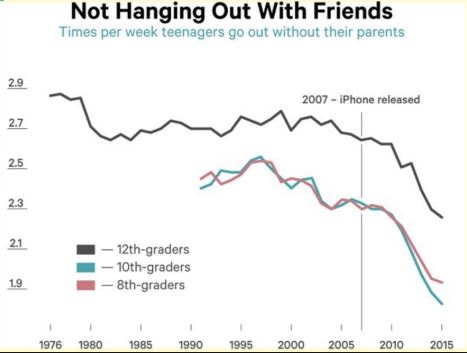Mobile Devices Information for Students and Parents
Mobile devices are defined at as any electronic web-enabled device that is portable such as a smart phone (iPhone, Android phone), laptop, iPad, and tablet. Increased access to Wi-Fi,decreased cost of web-enabled mobile devices, and the explosion of social media has led to a huge increase in screen time for individuals of all ages.
We believe in a balanced approach to screen time and social media use. There are many positive benefits of social media and mobile devices but there is also a growing amount of research around the negative impacts of over-use and excessive screen time on mental health, brain development, friendships, and academic achievement. The articles and videos below have been provided to you as a parent stay informed and educated in this ever-evolving area. There is also a Screen Time Resources for Parents page with more information. Each parent/guardian must decide what is best for their children with regards to their digital diet.
Impulsivity
The brains of adolescent children are going through significant change during their time in middle years school. Students demonstrate maturity is one moment and more impulsive risk-taking behaviors in another. The power of a mobile device ups the ante for a student to potentially make a decision of greater consequence. The attached 7-page article Demystifying the Adolescent Brain by Laurence Steinberg is an excellent 15 minute read that will help both parents and students to understand the development of the adolescent brain. Additional resources:
1. Compulsive texting associated with poor school performance in adolescent girls. American Psychological Association, October 2015.
Screen Time & Social Media
Studies indicate that students are averaging anywhere from 7-9hours per day of screen time. According to PEW Research Center the top 5 online platforms in order are: YouTube, Instagram, Snapchat, Facebook, and Twitter. The American Psychological Association recommends no more that 1.5-2 hours per day of total screen time for children under the age of 18. Additional resources:
1. Teens and dangerous levels of cell phone use. Psychology Today. Michael Unger Ph.D. , January 2018
2. Is screen time altering the brains of children. Healthline, December 2018. Shares preliminary results of the Adolescent Brain Cognitive Devlopment (ABCD) Study that is following more than 11,000 nine and ten-year-olds throughout the United States
3.Has dopamine hooked us on tech? The Guardian, March 2018.
4. Screen time is making kids moody, crazy, and lazy. Victoria L. Dunckley M.D., November 2015 .
5. Screen time guidelines for teens. Elana Ben-Joseph M.D., December 2016
Anxiety
A significant amount of research is coming in that demonstrates the link between raised levels of anxiety and social media. Additional resources:
1. Brandon teen bound for national science fair with study linking social media to poor mental health
2. CBC Story: Giving up social media for a week (3min)
3. Ted Talk: Is social media hurting your mental health (15min): Canadian social media expert Bailey Parnell talks about the negative impact of high social media use on her personally and offers solutions for better balance.
Inappropriate Use Of Devices
There are many students using their devices to send messages throughout the day and countless instances of students not adhering the Pembina Trails School Division Policy with regards to taking pictures of classmates during the school day. Social media platforms such as Snap Chat encourage students to take pictures daily to keep their 'streaks' going with their various chat groups.
Friendships and Connection
1. Ted Talk: iGen: The smartphone generation (7min) Professor Jean Twenge talks about the impact of smart phones on the first generation of students to grow up with these devices their entire life. Children are going out less without their parents and are more susceptible to poor mental health. She advocates for phones to be a "tool you use, not a tool that uses you".
Achievement
1. Mobile phone bans improve school exam results, research shows. The Guardian, May 2015.
 Acadia School
Acadia School 

Please provide your question and email address in the fields below.
Your question has been successfully submitted.
CloseThank you.